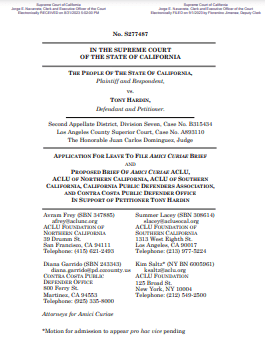
Summary of Argument
This Court should apply strict scrutiny in analyzing Petitioner’s equal protection claim under Arlington Heights. Section 3051(h)’s disparate impact, historical background, legislative history, and substantive departure from related statutory law all evidence a “tough on crime” politics grounded in racial prejudice. In particular, these factors reveal a legislative embrace of stereotypes regarding young men of color as amoral, subhuman, and uniquely dangerous to free society. In this light, Section 3051(h)’s denial of a youth offender parole opportunity to 18- to-25-year-olds sentenced to LWOP is best understood as a concession to race bigotry for political gain. Such discrimination warrants the most exacting judicial review.